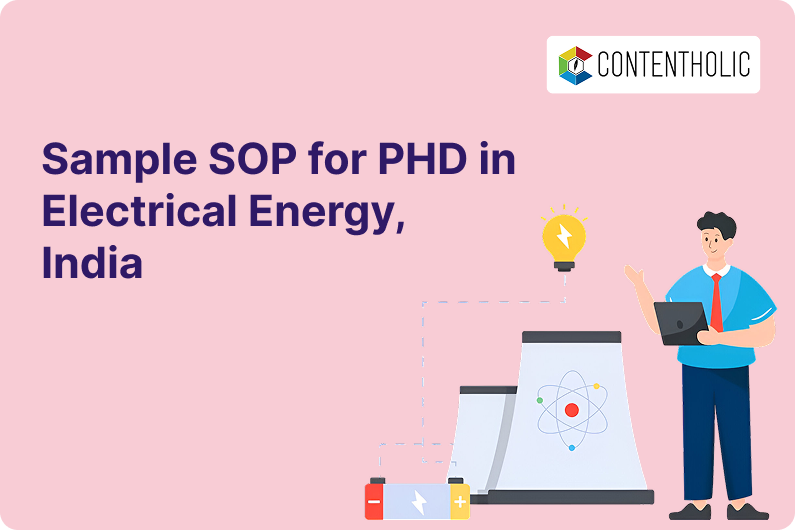Engineers have always been in high demand in every industry, especially electrical engineers. PhD in Electrical Engineering is one of the most sought-after programs as it is quite research-oriented. Among several countries in the world, India is one of the most affordable study-abroad destinations. It has world-class universities with top-tier faculty who teach PhD students of Electrical Energy. In an Electrical Engineering program, you learn how to design, develop, and maintain various kinds of electrical systems and equipment by studying the applications of electricity, electronics, and electromagnetism. A PhD in Electrical Energy involves a lot of extensive research work. While applying for this program at a university in India, you might be asked to write an SOP.
Let us first understand what an SOP is. An SOP is a written document in which you explain your reasons for pursuing a PhD in Electrical Engineering in India, and how it will help you advance in your career. It is quite important to write an SOP, as it helps the admissions committee determine your caliber and potential for their program. The way you structure your SOP has a significant say in determining your chances of admission. For your convenience, we have provided a sample SOP for PhD in Electrical Energy, India PDF in the latter part of this blog. By reading a sample, you will be able to understand how you should structure your SOP, based on the assigned format, kind of language, and tone that should be used. In case you require any additional help regarding SOP writing, you can consult agencies like Contentholic which provides one of the best SOP writing services in India. In this blog, we have provided you with a clear outline of how you should write a statement of purpose for Electrical Engineering.
How do I Write an SOP for a PhD in Electrical Energy, in India?
While writing an SOP for PhD-Electrical Energy, you need to include the details given below:
– Personal Information
You must start with a brief personal introduction, and write about the course and university you are applying for. To make the introduction more interesting, you can include a quote or a personal anecdote that is related to your passion for pursuing a PhD in Electrical Engineering.
– Academic History
Give a brief overview of your academic life, especially those events that explain how your interest in Electrical engineering began. Write about those aspects that motivated you to pursue a PhD in this domain. You can also include significant achievements or explain any leadership positions that you were assigned, or if you were part of any extracurricular activities that display your abilities and skills in a way, that makes you come across as a perfect fit for the program.
– Work Experience
If you had worked previously, then describe your professional roles and responsibilities. Write about how this experience made you want to pursue a PhD. You can also explain any particular work-related achievements that made you decide to pursue a PhD in Electrical engineering. Apart from this, if your previous job is related to the course you are applying for, explain how this experience will help you while pursuing a PhD.
– Why Pursue a PhD in Electrical Energy at an Indian university?
Highlight those aspects of the curriculum of the program that you are applying for that align with your interests and will help you achieve your career goals. You can talk about the factors due to which you decided to study at a particular Indian university, such as its ranking, accreditation, faculty, research and learning facilities, etc.
– Studying in India
Also write about those factors that made you want to pursue this program in India, and how that will help you advance in your career. You need to write about how India provides the best environment for your higher education.
– Career Goals
You need to provide an insight into what you intend to do after completing your PhD. Write about your short and long-term goals and how the PhD program will equip you with the required professional skills and abilities.
– Closing Statement
Towards the end, reiterate your interest in studying for a PhD in Electrical Energy in India, and how you look forward to embracing the beautiful Indian culture and hope to have an amazing experience there.
The sample SOP for PhD in Electrical Energy, India PDF given below will give you a basic understanding of how to write an SOP.
Below is the Sample SOP for PHD in Electrical Energy, India
To pursue a challenging career and to be a part of a progressive organization that gives scope to enhance my knowledge, skills and each pinnacle in the field of interest with dedication and hard work, is my ultimate goal in life.
My Bachelor’s Of Technology degree at FTC College Of Engineering and Research in Electrical engineering was the start of my increased skillsets in this realm. The four -year course trained me in disciplines such as mathematics, basic electrical engineering, electrical machine design, electrical machines(DC and AC machines, among others. I also gained experience with project management and planning, owing to my voracious participation in extra-curricular activities. I graduated with an aggregate of 70.63%.
This was followed by my postgraduate degree; Masters in Engineering from L.D. College Of Engineering in Ahmedabad. My postgraduate degree paved a way to refine my fundamental knowledge of the Electrical realm and further helped me to dwell deeper to understand the workings of machines. I passed this course with a 7.07 CPI. My project for this course highlighted the optimal selection of TCSC for congestion management using fuzzy logic. This degree particularly brought to light the workings of conventional and non-conventional power generation with a special understanding of electrical control and drives.
In addition to my degrees, I have always been involved in extracurricular projects. It was during a project assisting a professor in a village that I was able to understand the rote cause of delay in the development of villages. In villages, agriculture shines as the primary livelihood. But on the contrary, when primary needs like electricity and water aren’t met, agriculture is heavily affected which further deeply affects the self-reliance and development of a village as a whole.
My undergraduate and postgraduate degree cumulatively have assisted me to niche down my areas of interest. I would like to spend further time to excel in electrical control drives, hybrid renewable energy sources, and FACTS technology. Although, I would additionally like to get a deep grasp on the role of Artificial Intelligence in the Electrical world.
Moreover, workshops on MATLAB/ Simulink based hands-on power electronic converter based and their controllers have enhanced my skillset. Industrial Training at MSTCL, Pandharpur have bridged the gap of knowledge that can usually be encountered between the knowledge in books and the working in the practical world, when it comes to scientific matters. But my most cherished feat is working on and publishing my research project, titled, ” Optimal Location of TCSC Device for Congestion Management using Fuzzy Logic, in IJAREST, volume 04 ISUUE 04, April-2017. This also was the burning reason behind my career as a teacher.
My stint in the teaching world started with an assistant professor job at The Rajaram Shinde College Of Engineering Pedhambe in 2017. This was further followed by my present position as at an Assistant Professor at VPM, Maharshi College of Engineering. The work experience I garnered has been 2 years of tremendous professional growth for me. The last two years mentoring students in this field has also been an immensely fulfilling experience.
Helping a student with his project on vertical axis turbine for wind generation using an induction motor drive, came as a turning point when I found myself more immersed in the project that the student itself. Thus, I decided to further my knowledge and become a better teacher. To attain a deeper insight into the field of electrical, I now wish to pursue my Doctorate Degree in Electrical Energy at your esteemed university. Choosing to go back to the classroom is a critical decision for me and I especially aim at designing a hybrid grid system in accordance with geographic and climatic changes to help geographic and climate prone areas attain electricity and use other auxiliary services.
My goals from this Doctorate Degree aim at mentoring under Assistant Professor M. Venteshkumar, as he is a pioneer in the field of renewable energy sources, mainly solar and wind energy. Furthermore, I aim at working on my thesis on topics pertaining to the wind and solar energy using power converters. My primary objective at this point is to further my education in a structured manner which will allow me to apply my knowledge in the domain of electrical analytics. My short term goals comprise of working hard and putting my best front during my doctorate degree to graduate with honors meanwhile gaining a host of knowledge on electrical structures and evaluations. In the long term, I wish to take this learning and put it to use for the betterment of our suffering and underdeveloped villages. A Doctorate Program will offer me a targeted approach to understanding data that will boost my career prospects and portray my commitment to the field by specializing in my field.
Amrita Vishwa Vidyapeeth is the past has adopted eight hundred villages to help them transform to become a self- reliant to meet their energy needs. This presents itself as a great opportunity for real-time research in villages and will hence act as a control for the understanding of various electrical demeanors. Your vocational university offers an equal proportion of both shill-based vocational training along with a special focus on academic subjects. Amrita Vishwa Vidyapeeth is thus a good choice for my aforementioned goals and expectations from a Doctorate Degree in Electrical Energy. I thank you for taking the time for considering my application. I further hope, I would be considered for a position for your Doctorate Program in the realm of Electrical Energy. If provided with this opportunity, I assure you I would be hardworking and would diligently work to carve a name for myself and your honourable university.
Download PDF
 Download PDF of Sample SOP for PHD in Electrical Energy, India
Download PDF of Sample SOP for PHD in Electrical Energy, India
Conclusion
Pursuing a PhD in Electrical Energy in India is a great opportunity for people who are passionate about advancing the field of sustainable energy. As the above Sample of SOP for PhD in Electrical Energy written by our Top SOP Writers in India outlines, applicants should have a strong electrical engineering background, mastery of relevant technical skills, and a clear understanding of the research landscape in the field. In addition, successful applicants must demonstrate a clear motivation to pursue a PhD in electrical energy, including specific interests and an understanding of how their work will contribute to the broader goals of the field.
If you are struggling in writing a compelling SOP for PhD in Electrical Energy, then you must get in touch with our team and avail SOP writing services in India who will not only guide you in writing a commendable SOP but will assist you throughout your admission procedure in best Indian Universities.
Frequently Asked Questions (FAQs)
1. What is the word limit of an Electrical Engineering Statement of Purpose?
The word limit of an SOP for Electrical Engineering is between 1000-1200 words.
2. What are the various specializations offered in a PhD in Electrical Engineering program?
While pursuing a PhD in Electrical Engineering program, you can choose between various specializations such as:
- Computer Engineering & Architecture
- Robotics & Control
- Communications & Signal Processing
- Embedded systems
- Microelectronics & VLSI Design
- Power Systems & Control
3. Which universities in India offer the best PhD programs for Electrical Engineering?
The best universities in India which offer top-notch PhD programs for Electrical Engineering are:
- VIT Vellore
- Delhi Technological University
- IIT Kharagpur
- National Institute of Technology, Tiruchirappalli
- Indian Institute of Science, Bengaluru
4. Why is it important to submit an SOP for an MS in Electrical Engineering while applying to a university?
While applying to a university, it is important to submit an SOP for an MS in Electrical Engineering, as this document helps the admissions committee know more about you beyond your academic performance and helps them determine whether you are a good fit for their program or not.
5. How will reading a sample SOP for PhD in Electrical Engineering in India help me write an SOP?
By reading a sample SOP for PhD in Electrical Engineering, India PDF you will get a clear idea of how you should write an SOP as per the format, and the tone and kind of language you should use while writing.
6. What are the various jobs that I can apply for, after completing my PhD in Electrical Engineering?
The various jobs that you can apply for, after attaining a PhD degree in Electrical Engineering are:
- Computer Network Architect
- AI Engineer
- Innovations Specialist
- Research Scientist
- University Professor
- Product Development Specialist
7. How long does it take to attain a PhD degree in Electrical Engineering in India?
It takes 3-6 years to complete a PhD in Electrical Engineering in India.






